Shot Down Near Scoglitti |
In the early morning of Friday 9 July 1943 the
USS Philadelphia launched two scout observation floatplanes,
Curtiss SOC-3 Seagulls.
The airplane was a single engine scout biplane aircraft. This
type of aircraft served on U.S. Navy’s battleships and cruisers
and could be launched by catapult off the ship’s fantail.
After her mission, the pilot landed the seaplane near the ships,
that hoisted the plane on board. The wings could be folded for
storage inside the ship’s small hangar. The plane was equipped
with a Pratt&Whitney R-1340 nine cylinder air-cooled radial
engine, giving 550 hp. The seaplane was equipped with two light
.30 caliber machineguns. The plane could be armed with two small
bombs. The planes were also used for naval gunfire guiding and
aerial spotting.
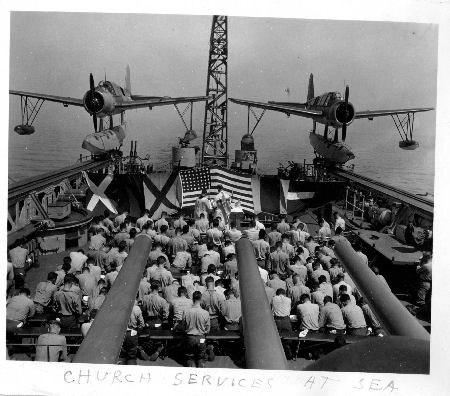
Church service on board of the USS Philadelphia.
Chaplain Burke
leading the service. Courtesy: Eileen Backofen
|
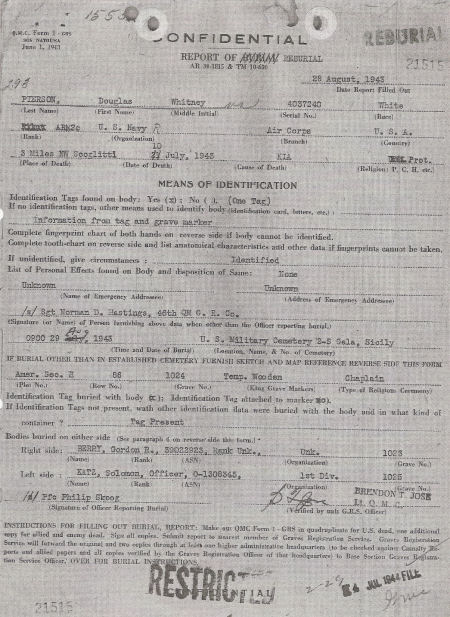 |
| |
|
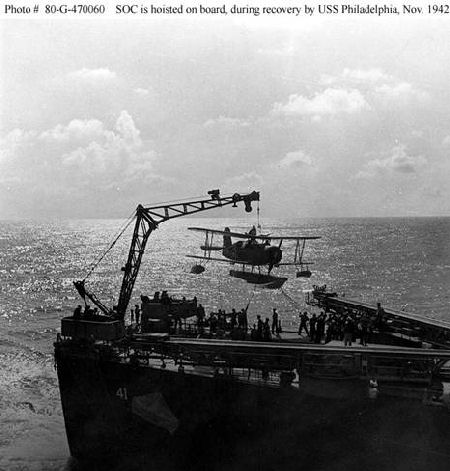
Courtesy: US Navy photograph [National Archives]
|
At 06:35 measures were taken on board of the
cruiser in steaming on various courses at various speeds for
launching the aircraft.
Seventeen minutes later Flight Quarters were sounded. Both pilot
and radioman/observer sped to their plane. The first seaplane
was catapulted at 07:20 hrs. Pilot of this plane, was Lieutenant
Mishanec, observer/gunner was Arm2C Douglas W. Pierson (Aviation
Radioman 2nd Class). The plane had markings 8-CS-4. Another Seagull
was launched one minute later. The men were given the order to
scout the area for German and/or Italian submarines. The planes
returned to the cruiser and were recovered at 08:24.
In the meantime the USS Philadelphia was subjected to enemy
air attacks. On 10 July at 04:26 hrs the ship was attacked by
a JU-87 Stuka dive bomber, the ship’s anti-aircraft guns
opened up. The Stuka dropped a bomb some 35 yards off the port
bow. Again the ship’s anti-aircraft guns opened up, now
on incoming unidentified planes.
On 10 July 1943 Douglas Pierson was airborne again. It was 06:01
hrs. Again the plane was piloted by Lieutenant Mishanec, two
more planes were launched. Tow hours later Mishanec and Pierson
were on board of the Philadelphia again. Lieutenant Commander
Richard D. Stephenson (from New York) took off in 8-CS-1 at 10:02,
his observer was Douglas Pierson. The plane was scouting CENT
area, off shore the coast of Scoglitti. It would be the men’s
last flight. Nearing the coastline of Scoglitti at an altitude
of some 1,000 feet the vulnerable seaplane was suddenly attacked
by two Messerschmitt Bf109’s. The Seagull was beyond the
range of the ship’s anti aircraft guns. At 13:13 hrs the
Seagull crashed into the waterline of the Mediterranean Sea some
three miles east of Gela, 3 miles northwest of Scoglitti and
some 100 yards offshore. The plane sank immediately.
|
| |
|
Both men were buried by the infantry in a field grave on the
side of the Via Riviera Gela, near the corner with the Strada
Baia Donca. The Via Riviera Gela is situated along the beach
and connects Scoglitti and Gela. When the temporary cemetery
at Gela was opened and circumstances permitted, the remains of
both men were exhumed and reburied at Gela. The other SOC-3,
launched by the USS Philadelphia, was piloted by Lieutenant P.E.
Coughlin; he survived an attack by a Messerschmitt Bf109. The
fighter planes were drive away by gunfire from a 5” battery
from the Philadelphia.
The Seagull was no match for the heavily armed Messerschmitt.
German fighter planes also attacked the seaplane, piloted by
Lieutenant Paul E. Coughlin. The Philadelphia’s anti-aircraft
guns succeeded in driving them away |
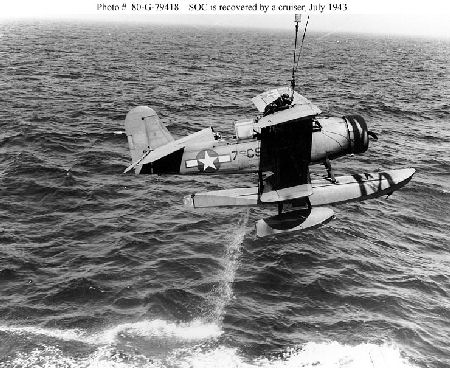 Courtesy: US Navy photograph [National Archives]
Courtesy: US Navy photograph [National Archives] |
|
|
|
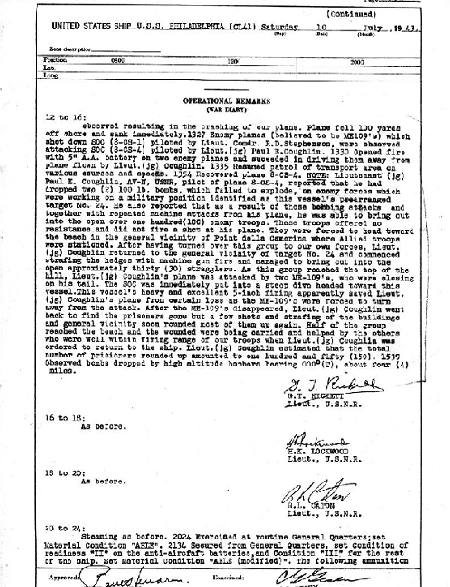
|
| |
|
When circumstances permitted, Lieutenant Commander Richard D.
Stephenson, ASN 75050, was exhumed from the field grave and transported
to the temporary American cemetery Gela, where he was buried
in plot/grave C-28-325.
Armd2C Douglas Whitney Pierson, ASN 4037240, was born on 15
May 1919 in Newark, New Jersey. He was buried in plot/grave H-86-1024
at Gela. Date of his burial was 29 August 1943 at 09:00 hrs.
He was buried by Sergeant Norman D. Hastings from the 46th Quartermaster
Graves Registration
Company. One of the so-called “dogtags” remained with
the body [On the Report of Reburial at Gela, a mistake was made.
While the date of burial was given 29 August 1943, the date that
the report was filled in was 28 August 1943].
Radioman Simpson remembers: “Pierson lost his life during
the invasion of south Sicily about 9 July 1943. He was in a SOC
plane that had been to seaward on a 4-hour anti-sub patrol. The
plane had just returned to the coastline and headed for the Philadelphia.
Suddenly the plane was attacked by a Messerschmitt ME-109. Pierson’s
plane crashed in shallow water and the army advised the ship that
they had recovered the bodies. The pilot was the Division Senior
Aviator Lieutenant Commander Stephenson. Pierson was RM1, a terrible
loss of two sharp aviators”.
Scoglitti beach: a downed German Bf109G-6
from 4. Staffel [Squadron]
/JG 53 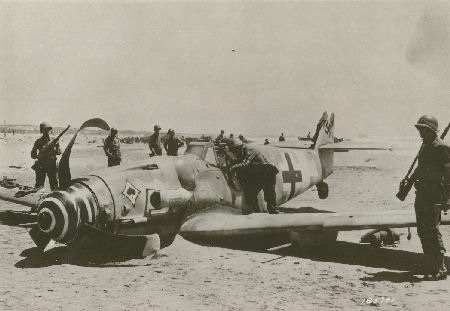
On 10 July 1943 the USS Savannah also launched two
Curtiss SOC-3 seaplanes. One of them was piloted by Lieutenant
Charles A. Anderson. His plane was also shot down by Messerschmitts.
The SOC crashed into the sea and Lieutenant Anderson was killed.
His observer survived the attack. Lieutenant Anderson was buried
at Gela in grave A-5-59. To-day he rests in a cemetery in Illinois.
Seems that the USS Boise also lost two SOC-3 planes on 10 July
1943 due to enemy fighter fire, the crewmembers survived.
|
|
One of the German fighter planes was piloted
by Leutnant Wilhelm Esser from Jagdgeschwader 53 [Fighter Group].
He shot down one of the Seagulls. Later that afternoon Leutnant
Esser, stationed at the airfield at Catania, shot down a Spitfire
near Syracuse in eastern Sicily.
|
| Leutnant Wilhelm Esser |
Picture Jagdgeschwader 53 |
When time permitted, Father Daniel J. Burke, Chaplain of the
USS Philadelphia, was able to visit the cemetery, he went to
the graves of Lieutenant Commander Stephensen and Radioman Pierson,
paid respects the said the following prayer:
“Dear God, most merciful Father in this hallowed ground
rest the earthly remains of two gallant heroes whom we are privileged
to call our shipmates. It was Thy most merciful will that they
should be gathered to Thy loving bosom and that we be preserved
to carry on the fight. Yet we know that this separation from
them is not forever. For Thou who art eternal truth hast clearly
promised that every one that liveth an believeth in Thee shall
no die forever. And we look forward to that reunion when sadness
and sorrow be no more, when Thou shalt wipe away all tears and
give true peace to our restless hearts. Bless then O heavenly
Father this grave. It is now truly a little bit of our native
soil of America. Grant that the deaths of our gallant shipmates
may give a rebirth to the world. May the weeping of their loved
one move Thy Heart to hasten the days of peace. May the sight
of us assembled on this foreign soil be a witness to Thee that
we covet no earth but that wherein our honored dead lie buried.
And may the moments we pass here be an instruction to us how
swift is life, how conclusive is death , how foolish is our conceit-our
pride-our vanity. Make us worth of our ship, our Navy, our country
even as these men were worthy. And when in loving mercy Thou
dost send Thine angel to summon us to Thee, may He find us ready,
willing and reconciled. May He find us even as He discovered
them-doing their duty, obeying and sacrificing that the souls
of all men might struggle out of the depths to the light of freedom.
This is our humble prayer. This our supplication. May the Angles
lead
them to paradise; may the apostles who loved the sea great souls
who have made their last crossing, and reached their home port.
May He who calmed the restless waves saying Peace be still – May
he who walked upon the waters grant them eternal rest in their
heavenly anchorage. And when the great captain calls us for His
final inspection may it be our blesses privilege also to hear Christ’s
own words – “Well done”. |
| |
|
In the years 1946-1947 the remains of both
men were exhumed from the Gela cemetery and transported to another
temporary American cemetery Mount Soprano/Paestum, now on the
Italian mainland, south of Rome. Both men were buried there in
plot/grave TGC-28-325 and TGH-86-1024 respectively. Arm2C Pierson
was buried at Mount Soprano on 14 April 1947 at 09:55 hrs. From
the moment of first burial in the Gela cemetery, correspondence
ensued between the US government and both families. The decision
was made by the next of kin of Richard D. Stephenson to have him
buried in the Sicily Rome cemetery south of Rome, where he was
buried with full military honors in grave J-15-39.
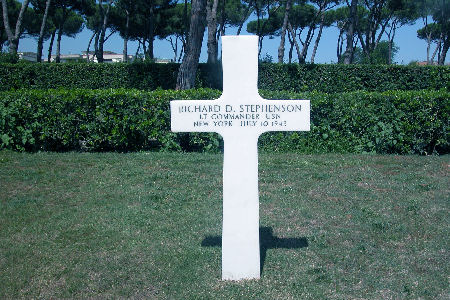
Courtesy: American Battle Monuments Commission, Sicily Rome Cemetery
|
On 8 June 1948 the remains of Douglas W. Pierson
were prepared for repatriation. His body was embalmed and taken
by truck to the Naples Port Morgue [Italy], awaiting transport
to the States.
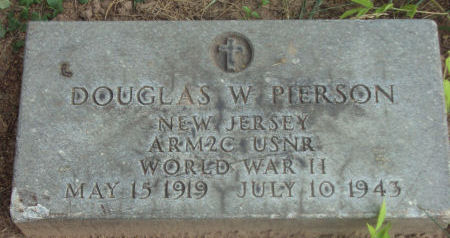
As soon as the USAT Carroll Victory [Victory ship] docked in
Naples, the coffin carrying the Pierson’s remains [plus
many other] were carried on board of the ship for his last voyage
home. The Carroll Victory left Naples on 6 July 1948. After the
docking in New York Harbor, his remains were transported by motor
vehicle and arrived in Newark on Wednesday 11 August 1948. Douglas
Pierson was buried in the Fairmount Cemetery in Newark, New Jersey.
The burial was carried out by Haeberle & Barth Funeral Company.
Douglas Pierson was buried in the cemetery on 14 August 1948.
His record gives his age at death as 24 years, Sicily as the
place of death, and “killed in action” as the cause.
He is buried in Section 10, Lot 147, Plot 3 Front.
|
| |
|
|